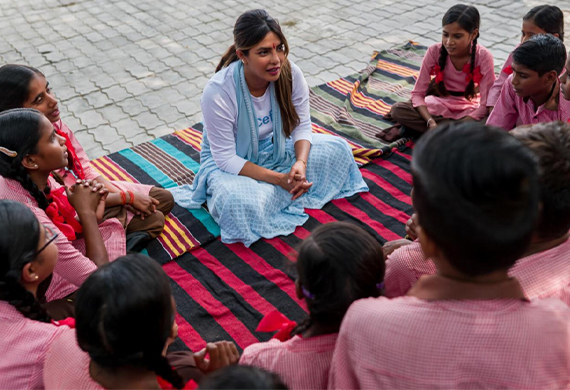
UNICEF Goodwill Ambassador Priyanka Chopra Jonas pushes for more Investment in Girls in India
By: WE Staff | Friday, 11 November 2022
This week, UNICEF Goodwill Ambassador Priyanka Chopra Jonas visited UNICEF programmes assisting in improving children's access to health, nutrition, and protection in Uttar Pradesh in northern India.
Chopra Jonas visited teenage girls from UNICEF-supported gender programmes during the two-day trip, and they spoke about their struggles and how they are overcoming abuse, emotional stress, and gender discrimination that they experience as a result of prevalent social standards.
“I’m so inspired by the resilience of the young girls I met on this visit,” said Chopra Jonas. They’ve overcome trauma and violence in their families, faced mental health challenges, and tackled child labour. The programmes I visited, supported by UNICEF and run by the Government, empower and nurture girls. They learn that there is strength in working with others when speaking out about the challenges they face and identifying the change they want to make for their future. When girls are strong, healthy and educated, they can change their communities and transform societies.”
In order to address violence against women and children in Uttar Pradesh, the government has established the police-run Women Power Line (WPL)-1090, a 24/7 Call Center that offers callers free real-time aid and psychosocial support. UNICEF is helping to make this programme possible.
Violence in any form is totally abhorrent in our society, according to Chopra Jonas. "It's encouraging to see so many individuals using our dedicated helplines to come forward and report cases because we know that the social stigma associated with violence frequently causes many crimes to go undetected. No woman or child should ever be subjected to physical, psychological, or sexual abuse.
“Gender equality contributes to safer, healthier and stronger societies,” said UNICEF India Representative Cynthia McCaffrey. “Girls can make a bigger difference in their lives, in their families, and in society when they are empowered through education, equal opportunities, and life skills. Investing in adolescent girls and boys can be transformative.”
Chopra Jonas engaged with pupils enrolled in "learning by doing" programmes during her visit to a school, a state-run, UNICEF-supported programme that combines academic learning and employment skills to promote kids returning to and staying in school.
"Schools alter lives," stated Chopra Jonas. "Through my work with UNICEF, I have personally witnessed how children bring their academic knowledge and acquired skills back home to better their lives and the lives of their families." The work UNICEF is doing with their Learning by Doing initiative is crucial as we continue to march toward gender parity. I met Zakir, a class seven student who is learning to cook, and an eight-year-old girl child, Mamta, who used her newly acquired skills to make smart shoes for the visually challenged. Breaking gender stereotypes, right from an early age, is so important.”
A primary health centre in the Lucknow area that supports moms and babies with nutrition and health as well as a Special Newborn Care Unit for unwell newborns were also visited by Chopra Jonas during the tour. 73% of newborn deaths in India still happen during the first 28 days of birth, with suffocation, preterm, and low birth weight being the leading causes of mortality in the first week after delivery.
Chopra Jonas met nursing and pregnant women who utilise a simple tool to learn about nutrition for themselves and their kids, as well as how to prepare simple nutritional meals so that children not only survive but thrive, at an Anganwadi Center, a rural Indian government childcare centre.
She also observed the POSHAN tracker, a cutting-edge programme made available by the Indian government to measure children's nutritional condition and growth in real-time.
According to Chopra Jonas, "India is at the forefront of quickly creating technology to improve lives and usher in new approaches to addressing difficulties for women and children, bringing them to scale." Children are using mobile phones to share their stories; women are using apps and gadgets to bring banking services to remote areas; mothers and expectant mothers are using growth monitoring devices to their advantage; and helpline and web-based police services are saving lives and keeping women and girls safe.






